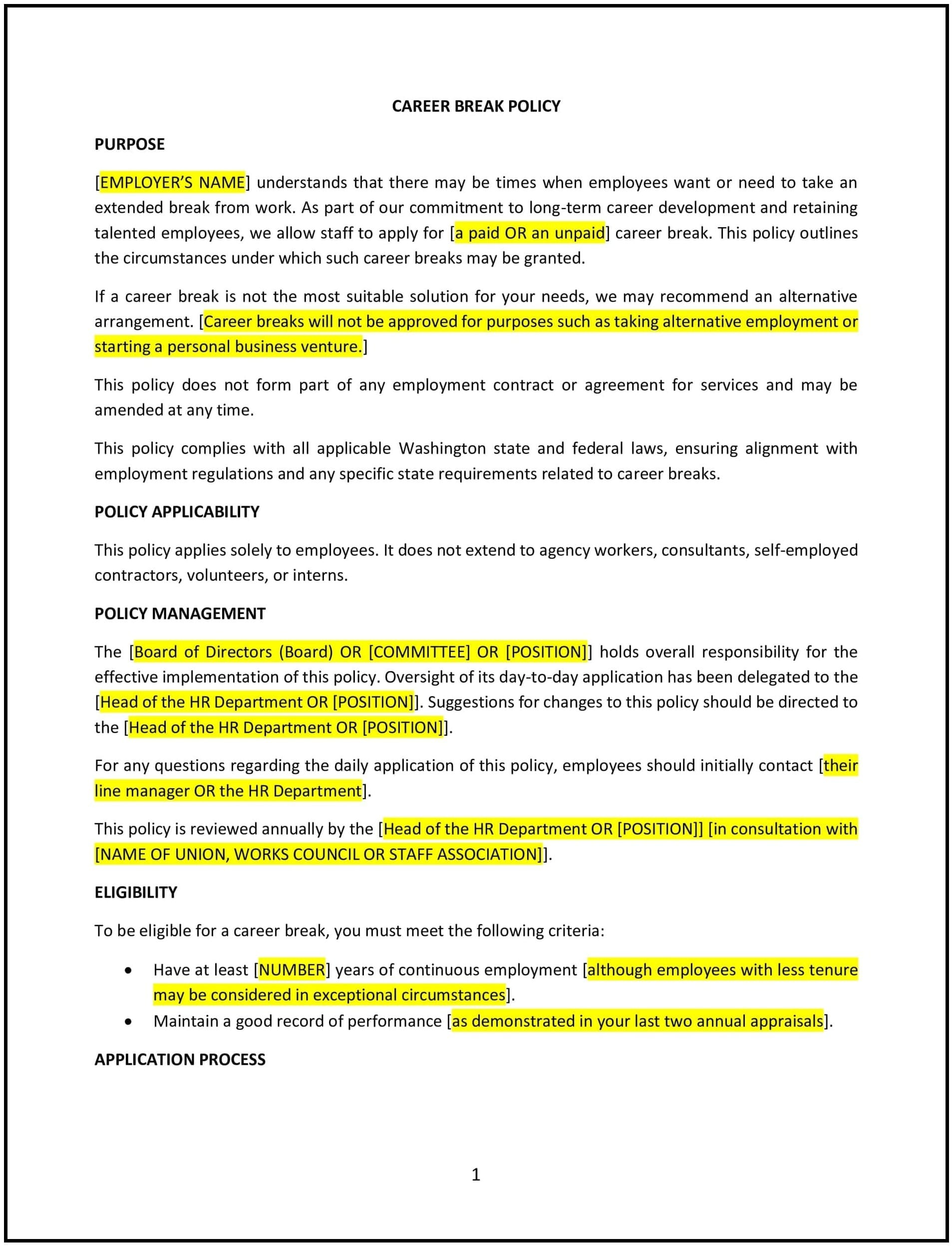Got contracts to review? While you're here for policies, let Cobrief make contract review effortless—start your free review now.

Customize this template for free
This career break policy is designed to help Washington businesses offer employees the option to take a temporary break from their work responsibilities, either for personal reasons, travel, education, or other life events. The policy outlines the conditions under which employees can apply for a career break, the process for approval, and the length of time for which breaks can be granted. It also details how the employee’s benefits and employment status will be managed during the break, and any expectations upon their return.
By adopting this policy, businesses can support employees in achieving a better work-life balance, retain valuable talent, and enhance overall employee satisfaction while managing staffing levels effectively.
How to use this career break policy (Washington)
- Define eligibility: Specify which employees are eligible for career breaks. The policy may limit eligibility to employees who have worked at the company for a certain amount of time or have met other criteria, such as a specific tenure or performance level.
- Set the duration of the break: Establish the length of career breaks, which may range from a few months to a year, depending on the company’s needs and the nature of the employee's request. The policy should clarify whether breaks can be extended and the maximum allowable duration.
- Specify the purpose of the break: Clarify what types of reasons are acceptable for a career break. This may include personal time, travel, education, caregiving responsibilities, or other significant life events. The policy should ensure that career breaks are taken for appropriate purposes and align with the company’s goals.
- Outline the application process: Describe the process for requesting a career break, including how far in advance employees must apply, who they should contact (HR, their manager), and any supporting documentation they may need to submit, such as a written explanation of the reason for the break.
- Address the management of benefits: The policy should specify how the employee’s benefits (e.g., health insurance, retirement contributions, paid time off) will be managed during the career break. It may be necessary for employees to continue paying for some benefits during their time off or the company may offer reduced benefits during the break.
- Define expectations upon return: The policy should outline the process for returning to work after a career break, including whether the employee will return to their original position or be reassigned to a similar role. It should also address how the company will handle staffing during the break and whether the employee is required to provide notice of their intention to return.
- Ensure compliance with Washington state and federal laws: The policy should comply with all applicable Washington state and federal labor laws, including any laws related to job protection, benefits, and return-to-work rights during and after a career break.
- Review and update regularly: Periodically review and update the policy to ensure it remains compliant with Washington state laws, federal regulations, and any changes in the company’s operations or employee benefits.
Benefits of using this career break policy (Washington)
This policy offers several benefits for Washington businesses:
- Increases employee retention: By offering employees the opportunity to take career breaks, businesses demonstrate flexibility and commitment to supporting employees’ personal needs, which can improve retention rates and overall job satisfaction.
- Fosters a supportive work environment: Providing career breaks promotes a healthy work-life balance and demonstrates that the company values its employees’ personal lives, leading to higher employee morale and engagement.
- Attracts top talent: Offering career breaks can be an attractive benefit for prospective employees, particularly those seeking flexibility in their work arrangements, such as working parents or those looking to further their education.
- Reduces burnout: Giving employees the chance to take time off when needed can help reduce workplace stress and burnout, which can increase productivity and overall job satisfaction upon their return.
- Enhances company reputation: A company that supports career breaks is viewed as progressive and employee-friendly, which can enhance its reputation as a desirable place to work and foster positive relationships with current employees and the wider community.
- Manages staffing effectively: The policy allows businesses to manage staffing levels and ensure coverage during career breaks, allowing for a more flexible workforce while minimizing disruptions.
Tips for using this career break policy (Washington)
- Communicate the policy clearly: Ensure that all employees are aware of the career break policy and understand the process for requesting a break. Include the policy in the employee handbook and review it during onboarding or at regular team meetings.
- Be flexible with approval: While there should be guidelines for granting career breaks, offer flexibility to employees where possible. Consider the business’s needs and ensure that each request is evaluated on a case-by-case basis.
- Manage benefits during the break: Ensure that employees are fully informed about the status of their benefits during their career break, including any requirements to maintain certain benefits or the process for resuming benefits when they return.
- Plan for staffing coverage: Develop a plan for covering the employee’s responsibilities during their absence, which may include temporary workers, task redistribution among other employees, or delaying non-essential projects.
- Provide support upon return: When employees return from a career break, ensure that they have the support they need to reintegrate smoothly into their roles. This may include training, mentorship, or a gradual return to full responsibilities.
- Review and update regularly: Periodically review the policy to ensure it remains compliant with Washington state laws, federal regulations, and any changes in the company’s operations or employee needs.